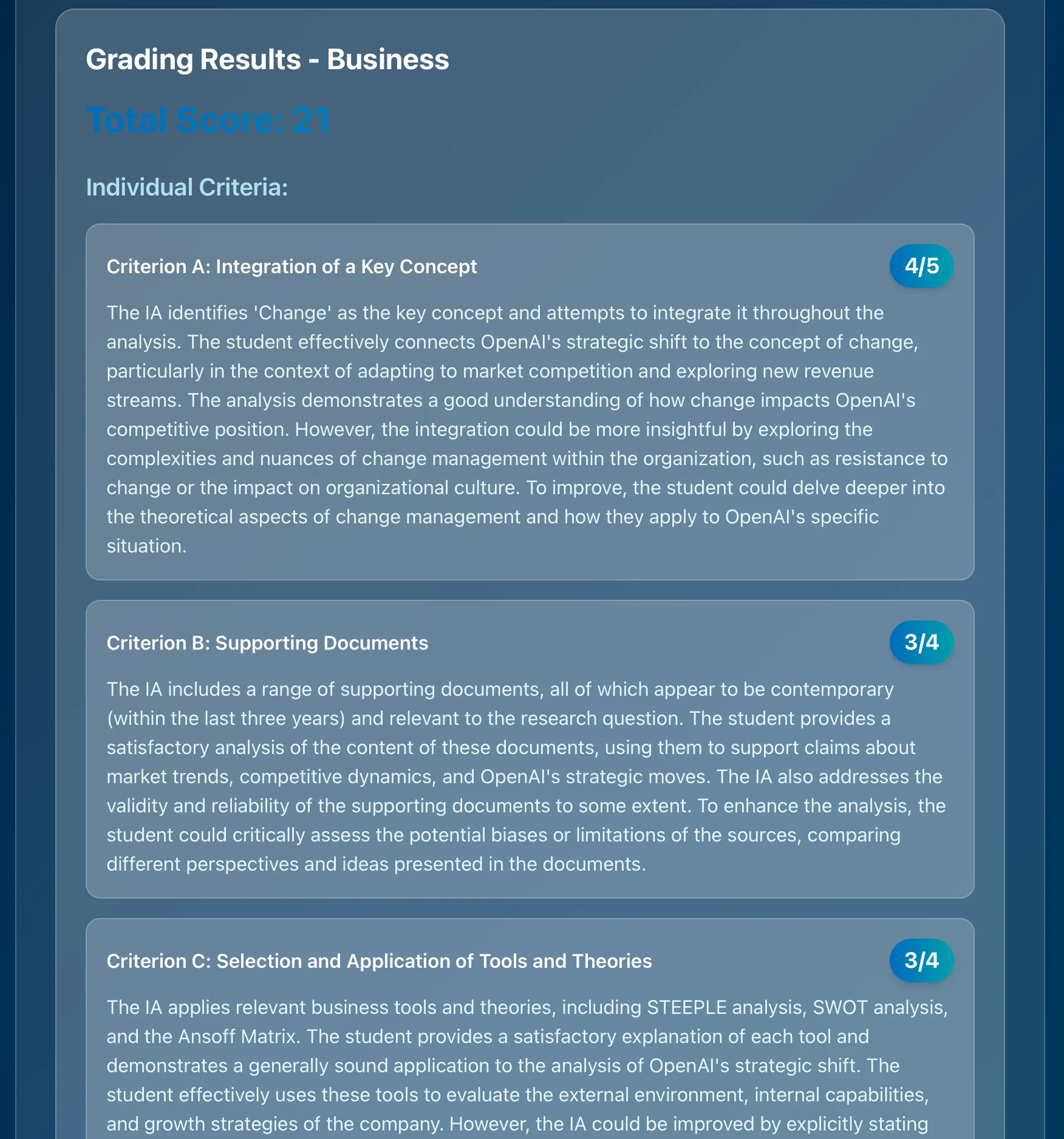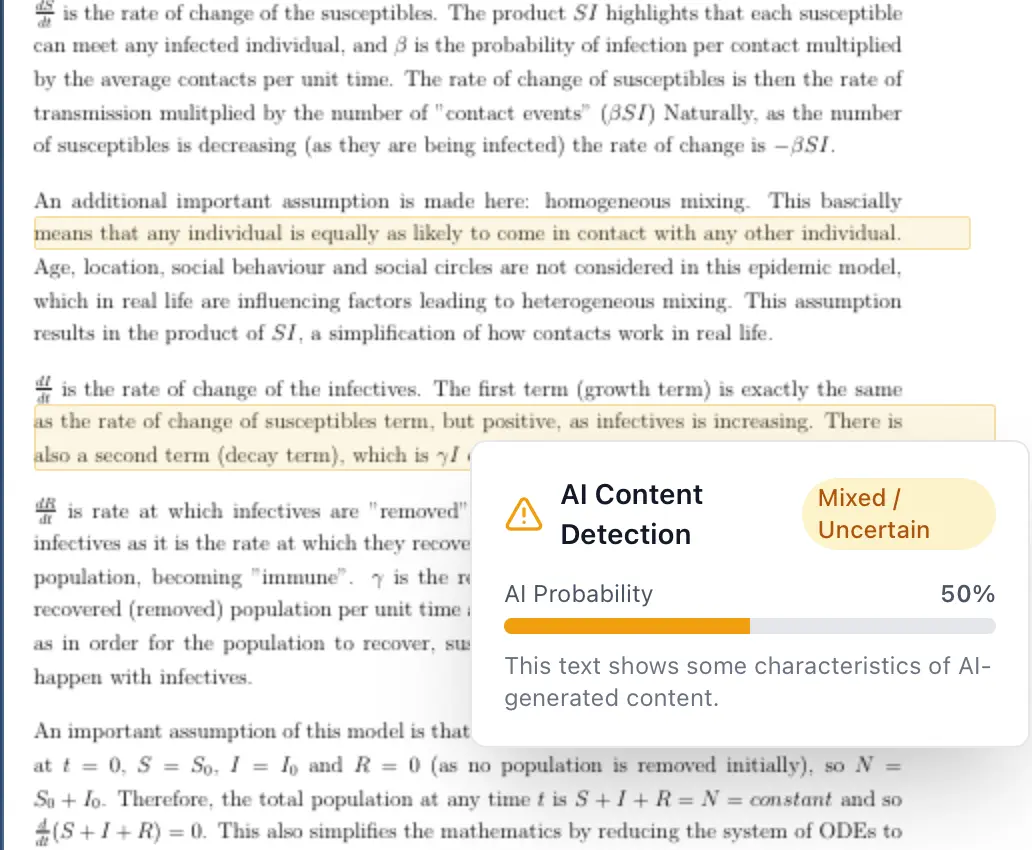A Guide to the Extended Essay Assessment Criteria
The IB Extended Essay (EE) is a cornerstone of the International Baccalaureate Diploma Programme, representing a significant independent research project. Understanding the Extended Essay assessment criteria is crucial for achieving a high grade. This comprehensive guide will break down each criterion, offering practical advice and strategies to help you excel. We'll explore what examiners look for, common pitfalls to avoid, and even how technology, including AI grading assistants, can support your success. Whether you're an IB student, teacher, or parent, this guide will provide valuable insights into mastering the EE.
What is the IB Extended Essay and Why is it Important?
The Extended Essay is a 4,000-word independent research paper undertaken by IB Diploma Programme students. It allows you to delve deeply into a topic of your choice, fostering critical thinking, research skills, and academic writing abilities. The EE contributes significantly to your overall IB score and is a key component of the diploma requirements. A well-executed EE demonstrates your ability to conduct independent research, analyze information, and present your findings in a clear and coherent manner.
Struggling with IB Assessments?
Get instant, detailed feedback on your work with AI that understands IB criteria.

Breaking Down the Extended Essay Assessment Criteria
The Extended Essay is assessed against five criteria, each with specific weighting:
- Criterion A: Focus and Method (6 marks)
- Criterion B: Knowledge and Understanding (6 marks)
- Criterion C: Critical Thinking (12 marks)
- Criterion D: Presentation (4 marks)
- Criterion E: Engagement (6 marks)
Let's examine each criterion in detail:
Criterion A: Focus and Method (6 marks)
This criterion assesses the clarity and precision of your research question, the appropriateness of your chosen methodology, and the overall focus of your essay.
- Focus: Is your research question clearly defined and focused? Does it allow for in-depth analysis within the word limit?
- Method: Is your chosen methodology appropriate for addressing your research question? Have you justified your choice of methods?
- Scope: Is the scope of your research manageable within the constraints of the EE?
Tips for Success:
- Choose a specific and focused research question. Avoid overly broad or vague questions. For example, instead of "What is the impact of climate change?", consider "How has rising sea level impacted coastal erosion rates in [Specific Location] over the past decade?".
- Clearly state your research question at the beginning of your essay. Make sure it's easily identifiable.
- Justify your chosen methodology. Explain why you selected a particular research method (e.g., surveys, experiments, textual analysis) and how it will help you answer your research question.
- Develop a clear and logical structure for your essay. This will help you maintain focus and ensure that your arguments are presented in a coherent manner.
Criterion B: Knowledge and Understanding (6 marks)
This criterion assesses your understanding of the topic, the quality of your research, and the appropriate use of sources.
- Knowledge: Do you demonstrate a thorough understanding of the relevant concepts and theories?
- Research: Is your research comprehensive and relevant to your research question? Have you consulted a variety of credible sources?
- Sources: Are your sources properly cited and referenced? Have you avoided plagiarism?
Tips for Success:
- Conduct thorough research. Consult a wide range of academic sources, including books, journal articles, and reputable websites.
- Demonstrate your understanding of key concepts and theories. Don't just summarize information; analyze and interpret it.
- Use a consistent citation style. Follow the IB's guidelines for referencing sources.
- Avoid plagiarism at all costs. Properly cite all sources, even if you are paraphrasing.
Criterion C: Critical Thinking (12 marks)
This is the most heavily weighted criterion, assessing your ability to analyze, evaluate, and synthesize information.
- Analysis: Do you analyze your research findings in a critical and insightful manner?
- Evaluation: Do you evaluate the strengths and limitations of your research? Do you consider alternative perspectives?
- Synthesis: Do you synthesize information from different sources to develop your own arguments and conclusions?
Tips for Success:
- Go beyond description. Don't just summarize your research findings; analyze their implications.
- Evaluate the validity and reliability of your sources. Consider the author's perspective, the publication date, and the potential biases.
- Develop your own arguments and conclusions. Don't simply repeat what others have said; offer your own insights.
- Consider alternative perspectives. Acknowledge and address counterarguments to strengthen your own position.
Criterion D: Presentation (4 marks)
This criterion assesses the clarity, organization, and overall presentation of your essay.
- Structure: Is your essay well-organized and logically structured?
- Clarity: Is your writing clear, concise, and easy to understand?
- Format: Does your essay adhere to the IB's formatting guidelines (e.g., font size, margins, spacing)?
Tips for Success:
- Create a clear and logical outline before you start writing.
- Use headings and subheadings to organize your essay.
- Write in a clear and concise style. Avoid jargon and overly complex sentences.
- Proofread your essay carefully for grammar and spelling errors.
- Follow the IB's formatting guidelines precisely.
Criterion E: Engagement (6 marks)
This criterion assesses your reflection on the research process and your personal engagement with the topic. This is assessed through the Reflection Form.
- Reflection: Does the reflection form demonstrate a thoughtful and insightful reflection on the research process?
- Engagement: Does the reflection form show a genuine interest in the topic and a willingness to learn from the experience?
Tips for Success:
- Start the reflection process early. Don't wait until the last minute to complete the reflection form.
- Be honest and reflective. Share your challenges and successes during the research process.
- Connect your research to your own interests and experiences.
- Demonstrate a willingness to learn from your mistakes.
Common Challenges and Mistakes in the Extended Essay
Many students struggle with the Extended Essay. Here are some common challenges and mistakes to avoid:
- Choosing a topic that is too broad or too narrow.
- Failing to develop a clear and focused research question.
- Not conducting thorough research.
- Plagiarizing sources.
- Failing to analyze and evaluate information critically.
- Not following the IB's formatting guidelines.
- Leaving the reflection form to the last minute.
Solutions and Preventive Measures:
- Brainstorm potential topics with your supervisor.
- Refine your research question iteratively.
- Use a variety of research resources, including academic databases and libraries.
- Use plagiarism detection software to check your work.
- Practice critical thinking skills by analyzing different perspectives and evaluating evidence.
- Familiarize yourself with the IB's Extended Essay guide.
- Schedule regular meetings with your supervisor to discuss your progress.
Pro Tip: Get AI-Powered Grading
Stop second-guessing your grades. Get instant feedback aligned with official IB rubrics.

Advanced Tips and Strategies for a Top-Scoring Extended Essay
To achieve a top score on your Extended Essay, consider these advanced tips and strategies:
- Develop a strong thesis statement that clearly articulates your argument.
- Use evidence from your research to support your claims.
- Engage with existing scholarship on your topic.
- Demonstrate intellectual curiosity and a passion for your subject.
- Seek feedback from your supervisor and peers.
- Revise and edit your essay multiple times.
- Pay attention to the nuances of language and style.
- Go beyond the minimum requirements.
Technology and Modern Assessment: How AI Can Help
Technology is transforming the way we approach education, and the Extended Essay is no exception. AI-powered tools can assist with various aspects of the research and writing process, from finding relevant sources to improving the clarity of your writing.
One of the most significant advancements is the development of AI grading assistants. These tools, like Marksy, can provide instant, accurate, and detailed feedback on student work based on official IB rubrics. Marksy helps teachers provide consistent and comprehensive feedback, saving them valuable time while ensuring that students receive the guidance they need to improve.
Marksy uses official IB criteria to analyze essays, providing criterion-by-criterion feedback and suggestions for improvement. This helps students understand exactly how to meet the expectations of the examiners and achieve a higher grade. By leveraging AI, teachers can focus on providing personalized support and guidance to their students, rather than spending hours manually grading essays. The AI ensures fairness and consistency in grading, which is crucial for maintaining the integrity of the IB program.
Furthermore, AI tools can assist with plagiarism detection, grammar checking, and citation management, helping students avoid common mistakes and ensure the academic integrity of their work.
Conclusion: Your Path to Extended Essay Success
The Extended Essay is a challenging but rewarding experience. By understanding the assessment criteria, avoiding common mistakes, and leveraging technology to your advantage, you can increase your chances of achieving a high score. Remember to choose a focused research question, conduct thorough research, analyze information critically, and reflect on your learning journey.
Ready to take your IB Extended Essay to the next level? Try Marksy for free and experience the power of AI-driven feedback. Sign up for a free trial today and discover how Marksy can help you improve your IB scores and streamline your grading workflow!